| (insert your NIE or newspaper logo here) |
Weekly Online LessonOnline Lesson ArchiveGrade Level: 7-12
|
Space Mission Renews China's Pride
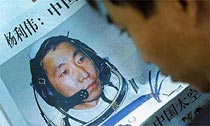 On
Wednesday, October 15, 2003, China became the third country to launch
a manned spacecraft into orbit, following the Soviet Union and the United
States.
On
Wednesday, October 15, 2003, China became the third country to launch
a manned spacecraft into orbit, following the Soviet Union and the United
States.
Eleven years went into planning the mission to launch Shenzhou 5, or "Divine Ship," from the nation's space center in the Gobi Desert. China's first taikonaut (the Chinese word for astronaut) is Yang Liwei, a 38-year-old fighter pilot from an agricultural region of northeast China. He orbited the Earth 14 times, then landed safely on the grasslands of Inner Mongolia the following morning.
The mission's success bodes well for China's hopes to expand its reach into the cosmos. But, just as importantly, the event has boosted the nation's pride.
China, a population of nearly 1.3 billion (including Taiwan) led by a Communist government for more than 50 years, has been struggling with economic depression, concerns over human rights, and establishing a solid place among other large nations on the global stage.
For this week's lesson you'll learn about this ancient region's people, and how their culture and society changed over the years.
Imperial China
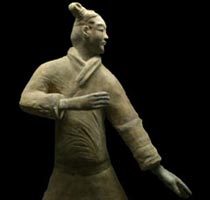 Begin
your journey into Asia with Imperial
China — A Legacy, a ThinkQuest project.
Begin
your journey into Asia with Imperial
China — A Legacy, a ThinkQuest project.
Enter the site, and begin your exploration into China's 5,000-year history with the Dynasties. As you browse through the dynasties, feel free to jump to any related categories, such as the Major Events, People, Culture, and Sciences of that period.
The site is presented in frames, and if you jump from one kind related category to another, just hit your browser's Back button to return where you left off.
Start with the Qin dynasty and move through the ages to the West Han and East Han. Who claimed himself the "First Emperor of Qin" and why? How did he choose to rule his people, and how many years did it last? How did Liu Bang — and his Han successors — rule differently, and how did that affect the region's population? What circumstances caused East Han to fall apart?
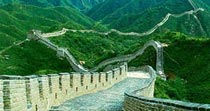 Next
spend some time with the Three
Kingdoms. Why has this period been regarded by many as
the "greatest period of warfare" in China? What is the significance
of the Swearing
of Brotherhood? Who were the Five
Tiger Warriors?
Next
spend some time with the Three
Kingdoms. Why has this period been regarded by many as
the "greatest period of warfare" in China? What is the significance
of the Swearing
of Brotherhood? Who were the Five
Tiger Warriors?
Continue moving through the dynasties, from the Two Jin to the Tang, the Yuan, and through to the final dynasty, the Qing.
How did rulers change over the decades, and how did each one's particular personality, experience and ideals shape the region? Were periods of stability the only time when the populations enjoyed prosperity? How did stability influence developments in science, culture, and art?
Communist China
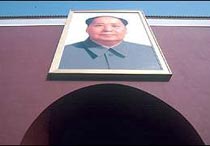 For
a great introduction to how China became a Communist country, make a
stop at the BBC site, China's
Communist Revolution — A Glossary.
For
a great introduction to how China became a Communist country, make a
stop at the BBC site, China's
Communist Revolution — A Glossary.
As you read about two of this period's important leaders, Mao Zedong and Chiang Kai Shek, click on the yellow text to learn more about those people and events.
What exactly is the connection between Mao and Chiang? In what ways do you think modern China might be distinctive, if events had unfolded differently? What was the role of the Red Army during this time? What was the significance of the Long March?
Also read about the Great Leap Forward and the Iron Rice Bowl. Why were such initiatives critical to ensure Mao's power over the masses?
Continue moving through the index, learning about how the Cultural Revolution changed the lives of most Chinese. How did the Little Red Book fit in to this societal shift? What happened to the Gang of Four?
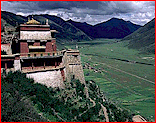 Who
was Deng
Xiaoping? What was his role in the 1980s? What was the
Democracy Wall? What happened at Tiananmen
Square and why? What made this demonstration different
from others previously held?
Who
was Deng
Xiaoping? What was his role in the 1980s? What was the
Democracy Wall? What happened at Tiananmen
Square and why? What made this demonstration different
from others previously held?
If you have time, visit Discovering China, The Middle Kingdom, another ThinkQuest project. Here, you can uncover even more details about China's post-imperial History and the Cultural Revolution.
You can also learn about some of the Movers & Shakers that have lived and are living during this era, and check out some of the country's CityScapes.
In what ways have this country's political leaders, as well as leaders in science and culture, shaped modern China? How has the nature of each CityScape changed over time?
Newspaper Activities
Browse current issues of Targetnewspaper, and track down stories about China. These may be articles about Chinese culture, government, their bid for hosting the 2008 Olympics in Beijing, or more about their space program? How do the Chinese view themselves, and how does that compare to how others, particularly those in other governments and nations, view them? For example, has their player status changed as a result of their recent space mission success? Does China's society or way of governance seem to be shifting at all? If so, what is influencing the shift? If not, then why not?
© Copyright 2003
Learners Online, Inc.
